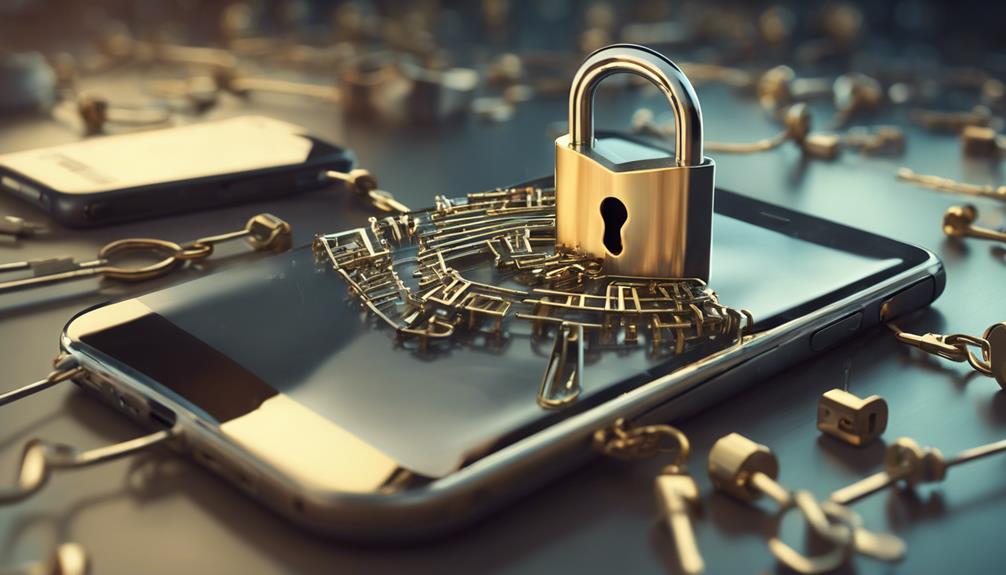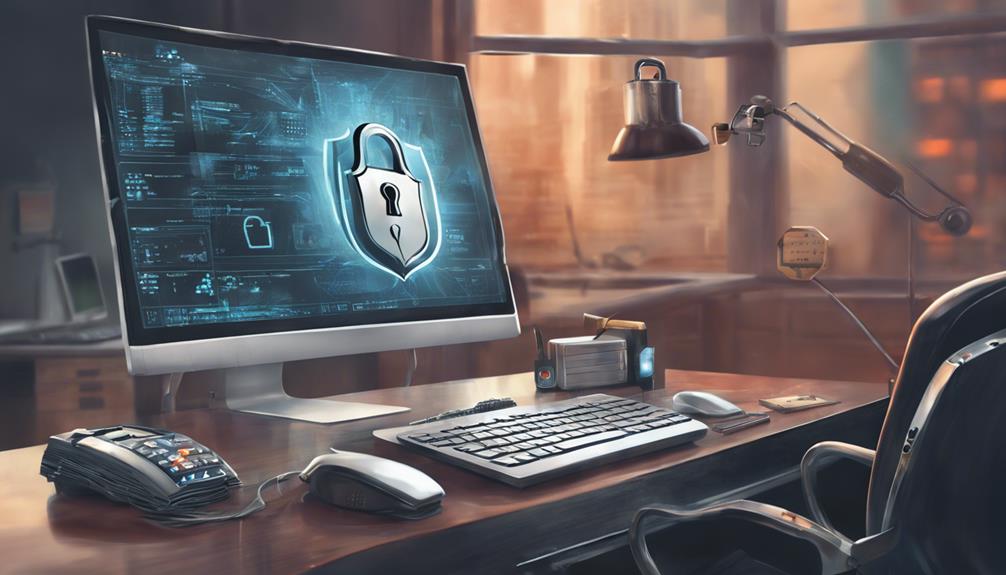VoIP, although advantageous, faces security risks that hackers can exploit. Malware, viruses, and DOS attacks threaten VoIP systems, leading to unauthorized access and financial harm. Safeguarding VoIP requires encryption, network security, and vigilant monitoring. Strong passwords and regular updates bolster security. Selecting reputable providers and prioritizing security measures are crucial. VoIP encryption makes call interception challenging for hackers. Implementation of secure networks and authentication mechanisms is essential. To learn more about protecting VoIP from hackers, explore further details on VoIP security measures and best practices.
Key Takeaways
- VoIP can be safe with encryption.
- Strong passwords and authentication prevent hacking.
- Regular security updates are crucial.
- Monitoring for suspicious activity enhances safety.
- Choosing a reputable provider strengthens VoIP security.
VoIP Security Threats
VoIP systems face a multitude of security threats, including malware attacks, viruses, phishing (vishing), and DoS attacks, making it essential for organizations to prioritize robust security measures. These vulnerabilities expose VoIP systems to potential breaches, allowing hackers to gain unauthorized access and compromise sensitive data. VoIP hacking poses a significant risk to businesses, as cybercriminals can exploit security loopholes to intercept calls, commit VoIP fraud, or disrupt communication channels.
Security breaches in VoIP systems can lead to financial losses, reputational damage, and regulatory consequences. To protect your VoIP system, implementing stringent security measures is vital. This includes securing your network, using encryption protocols, regularly updating software, and monitoring for suspicious activities.
VoIP Security Best Practices

When implementing security measures for Voice over Internet Protocol (VoIP) systems, it is essential to adhere to best practices to guarantee strong protection against potential threats. Here are some Security Best Practices to secure your VoIP system effectively:
- Utilize Strong Passwords and Two-Factor Authentication: Implementing complex passwords and multi-factor authentication adds an extra layer of security to prevent unauthorized access to your VoIP system.
- Regularly Update Software and Firmware: Keeping your VoIP system software and firmware up to date is vital in patching known vulnerabilities and safeguarding against potential security breaches.
- Employ Real-time Transport Protocol (SRTP): By using SRTP, you can encrypt the data transmitted during VoIP calls, ensuring that your communications remain confidential and secure from eavesdropping attempts.
- Verify the Reputation of your VoIP Provider: Choose a reputable source for your VoIP services to mitigate the risk of falling victim to toll fraud or other malicious activities. Conduct thorough research before selecting a VoIP provider to make sure they prioritize security measures.
Is VoIP More Secure Than Landline?

Compared to traditional landline systems, the security of Voice over Internet Protocol (VoIP) is generally considered to be more advanced due to encryption protocols and enhanced security measures. VoIP providers offer sophisticated security features such as encryption, firewalls, and regular security updates to safeguard against hacking attempts.
In contrast, landline systems are more vulnerable to physical wire tapping, whereas VoIP encryption makes it challenging for hackers to intercept calls.
VoIP systems can further bolster their security by implementing strong passwords, multi-factor authentication, and monitoring for any unusual call activity. While no system is entirely impervious to hacking, VoIP offers heightened security features compared to traditional landlines.
Choosing a Secure VoIP Provider

Selecting a secure VoIP provider requires careful consideration of their security features and measures. Look for providers that offer robust encryption protocols, stringent network security, and reliable authentication methods.
Prioritize providers that prioritize multi-factor authentication, regular security updates, and strong communication encryption to safeguard your communications and data effectively.
Secure VoIP Features
Secure VoIP features play an essential role in safeguarding communications by offering end-to-end encryption and robust security measures, making the choice of a secure VoIP provider vital for users seeking protection from potential hacking threats.
When selecting a secure VoIP provider, consider the following key features:
- End-to-End Encryption: Secure VoIP providers offer end-to-end encryption to protect calls and messages from unauthorized access.
- User Authentication: Reputable VoIP providers implement strong user authentication processes to ensure only authorized users can access the system.
- Anti-Spam Features: To prevent spam and malicious attacks, secure VoIP systems incorporate anti-spam features.
- Password-Protected Chats: Secure VoIP platforms store texts securely and require password-protected chats for an extra layer of security.
Evaluating the security policies and measures of potential VoIP providers is crucial in safeguarding against data breaches and hacking threats in the domain of VoIP technology.
Provider Security Measures
When evaluating VoIP providers for secure communication needs, prioritizing robust security measures is essential to safeguard against potential hacking threats.
Look for VoIP providers that offer strong encryption protocols, secure authentication processes, and regular security updates to enhance data protection.
Additionally, consider providers with certifications like ISO 27001, which demonstrate a commitment to information security management.
Opt for VoIP providers with a proven track record of delivering secure service and handling security incidents effectively.
It is vital to select a provider with transparent security policies and a proactive approach to cybersecurity to mitigate risks effectively.
Ensuring VoIP System Security

To maintain the integrity of VoIP systems and protect against potential security breaches, it is crucial to diligently implement robust security measures.
- Utilize Security Features: Incorporate strong passwords, encryption protocols, and firewalls to fortify the defense of VoIP systems against unauthorized access.
- Establish Secure Network Connections: Guarantee that all network connections used for VoIP communications are secure, especially to prevent hackers from exploiting vulnerabilities in unsecured WiFi networks.
- Regular Security Updates: Keep the VoIP system updated with the latest security patches and software upgrades to address known vulnerabilities and enhance overall system security.
- Monitor Call Logs and Conduct Security Assessments: Regularly review call logs for any unusual patterns or suspicious activities that could indicate hacking attempts. Additionally, perform periodic security assessments to proactively identify and mitigate potential security risks.
Getting Started With Secure Voip

To guarantee the security of VoIP systems, understanding the basics of encryption and implementing secure networks are fundamental steps. By encrypting voice data during transmission, sensitive information is protected from potential interception by hackers.
Establishing secure networks with firewalls and intrusion detection systems adds layers of defense against unauthorized access to VoIP communications.
VoIP Encryption Basics
Implementing robust encryption protocols is essential for guaranteeing the security of VoIP communications, safeguarding voice calls and data from unauthorized access and interception.
Secure VoIP systems employ end-to-end encryption to protect voice calls and data, ensuring that information remains confidential and inaccessible to malicious actors.
Encryption plays a vital role in scrambling voice data, rendering it unreadable to unauthorized users.
By implementing advanced encryption standards such as Transport Layer Security (TLS) and Secure Real-time Transport Protocol (SRTP), VoIP communications can be safeguarded against eavesdropping, tampering, and unauthorized access by hackers.
- End-to-end encryption is crucial for protecting the confidentiality of voice calls and data.
- TLS and SRTP are encryption protocols commonly used to secure VoIP communications.
- Encryption ensures that voice data is scrambled, making it indecipherable to unauthorized users.
- Secure VoIP systems prevent eavesdropping and unauthorized access to sensitive information.
Implementing Secure Networks
Enhancing VoIP security begins with establishing secure networks through encrypted WiFi connections to safeguard against potential eavesdropping threats. With 83% of organizations facing data breaches in the past year, the importance of secure VoIP networks is paramount.
Opting for a secure VoIP provider is a critical step in shielding against hackers seeking to exploit vulnerabilities within the system. Unencrypted WiFi networks can expose VoIP systems to malware attacks, viruses, and phishing attempts, underscoring the necessity of encryption.
To maintain a secure VoIP environment, regular software updates and security audits are essential practices. These measures help in identifying and mitigating potential security risks, ensuring that the network remains resilient against evolving cyber threats.
Benefits of Secure VoIP Systems

Securing VoIP systems through encryption and robust authentication mechanisms guarantees protection against unauthorized access and eavesdropping on conversations.
To further emphasize the benefits of secure VoIP systems, consider the following:
- Encryption: Utilizing encryption protocols ensures that data transmitted over VoIP networks remains confidential, preventing hackers from intercepting sensitive information.
- Strong Passwords and Multi-Factor Authentication: Implementing strong passwords and multi-factor authentication adds layers of security, making it more difficult for unauthorized users to breach VoIP systems.
- Software Updates: Regularly updating software and firmware patches vulnerabilities that hackers could exploit, strengthening the overall security posture of VoIP systems.
- VPN and Secure Provider: Employing a Virtual Private Network (VPN) for remote employees and selecting a reputable VoIP provider that prioritizes security measures are essential steps in safeguarding against potential hacker threats.
VoIP Security Checklist

When ensuring the security of VoIP systems, several key points must be considered. These include:
- The importance of VoIP encryption to safeguard communications.
- Configuring VoIP systems securely to prevent unauthorized access.
- Being aware of potential threats that could compromise VoIP security.
VoIP Encryption Importance
Implementing strong encryption protocols in VoIP systems is crucial for safeguarding sensitive data and conversations from potential hacking threats. Encryption plays an essential role in ensuring the privacy and security of VoIP communications, protecting them from unauthorized access and interception.
Here are four key reasons highlighting the importance of VoIP encryption:
- Protect Sensitive Data: Encryption in VoIP systems shields confidential information, such as personal details and financial transactions, from falling into the wrong hands.
- Prevent Eavesdropping: Strong encryption protocols help in preventing malicious actors from listening in on VoIP calls and gathering sensitive information.
- Secure Voice Data: By encrypting voice data, the integrity and confidentiality of the conversations are maintained, even when transmitted over the internet.
- Enhanced Security with Encrypted WiFi Networks: Utilizing encrypted WiFi networks adds an extra layer of security, reducing the risk of unauthorized access to VoIP communications.
Secure VoIP Configuration
Setting up a secure VoIP configuration is essential to protect against potential security threats and maintain the integrity of communications. To enhance security and prevent unauthorized access to VoIP phone systems, it is important to follow a thorough VoIP security checklist. This checklist should include regularly updating software and firmware to address security vulnerabilities promptly.
Additionally, implementing strong password security measures and enabling encryption can safeguard communications from potential breaches. To add an extra layer of protection, consider setting up firewalls to monitor and control network traffic effectively.
Furthermore, incorporating two-factor authentication can greatly enhance the security of VoIP systems by requiring additional verification steps for access. Utilizing Virtual Private Networks (VPNs) for remote workers can also contribute to a more secure environment by encrypting data transmissions and preventing unauthorized access.
Threats to VoIP Systems
VoIP systems face a myriad of security threats, including malware attacks, phishing, viruses, and DoS attacks, making it important for organizations to prioritize the implementation of a thorough VoIP Security Checklist.
To mitigate these risks effectively, organizations should consider the following key measures:
- Secure VoIP Provider: Choosing a secure VoIP provider is vital as it forms the foundation of a secure communication network.
- Strong Passwords and Multi-factor Authentication: Implementing strong passwords and multi-factor authentication adds layers of security to VoIP systems, making unauthorized access more challenging.
- Regular Security Audits: Conducting regular security audits helps identify vulnerabilities in VoIP systems and allows for timely remediation.
- Firewall Monitoring and Software Updates: Monitoring firewalls and ensuring timely software updates are essential practices to protect VoIP systems from evolving cyber threats.
VoIP Fraud Prevention

Enhancing security measures is essential in mitigating the risk of VoIP fraud within businesses and networks. VoIP fraud poses a significant threat, especially for small businesses that may bear the financial burden of phone system security breaches.
To combat this, implementing VoIP fraud prevention measures such as disabling international calling and monitoring off-hours activity is vital. Scammers often take advantage of vulnerabilities in VoIP systems, particularly during times of reduced monitoring, such as holidays and off-peak hours.
Protecting Voip System From Hacking

Implementing robust security measures is imperative to safeguard VoIP systems from potential hacking threats. To protect VoIP phone systems effectively, consider the following measures:
- Secure Passwords: Utilize complex passwords with a combination of letters, numbers, and special characters to prevent unauthorized access.
- Regular Software Updates: Keep VoIP system software up to date to patch vulnerabilities that hackers could exploit for unauthorized access.
- Security Audits: Conduct regular security audits to identify and address any weaknesses or potential entry points for hackers.
- Choose a Secure VoIP Service Provider: Select a reputable VoIP service provider that prioritizes security and implements robust measures to protect against hackers.
Frequently Asked Questions
Is Voip a Security Risk?
VoIP poses security risks due to vulnerabilities such as unauthorized access and data theft. The security of VoIP systems relies on robust IT infrastructure, internet security measures, and the chosen provider. Mitigating risks is essential.
Can a Voip Line Be Hacked?
A VoIP line can be vulnerable to hacking if not properly secured. Implementing strong passwords, encryption, and regular monitoring can help safeguard VoIP systems from potential attacks. Choosing a secure provider and adhering to best practices are essential.
Can a Voip Phone Be Tapped?
VoIP phones can be tapped by hackers through methods like eavesdropping on unencrypted calls or intercepting calls over unsecured networks. Implementing encryption protocols, updating software/firmware, and using strong authentication can enhance security.
What Attacks Are Voip Most Vulnerable To?
In the domain of cybersecurity, VoIP systems are particularly susceptible to malware attacks, phishing attempts, eavesdropping on unencrypted networks, denial-of-service attacks, and social engineering tactics. Safeguarding against these vulnerabilities is paramount.
Are Voip Calls Safe?
VoIP calls can be secure when proper security measures are implemented, such as encryption, strong passwords, and regular software updates. Choosing a reputable VoIP provider and following best security practices can help guarantee the safety of VoIP calls.
Conclusion
To sum up, VoIP systems are susceptible to hacking if not properly secured. By implementing best practices and choosing a reliable provider, businesses can greatly reduce the risk of security breaches.
According to a report by the Federal Communications Commission, over 90% of unauthorized access to VoIP systems is due to weak security measures. It is essential for organizations to prioritize the security of their VoIP systems to protect sensitive information and prevent fraud.









